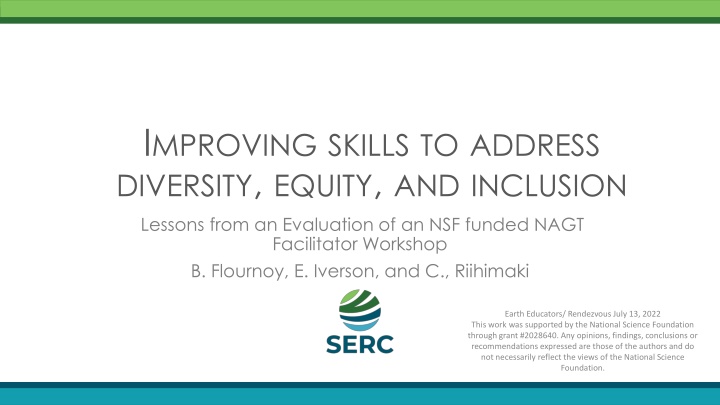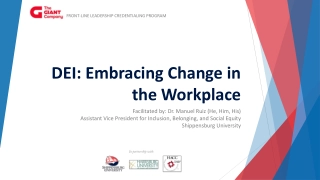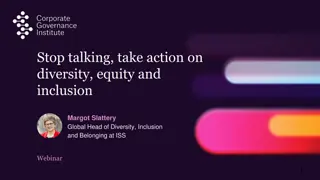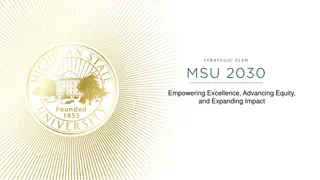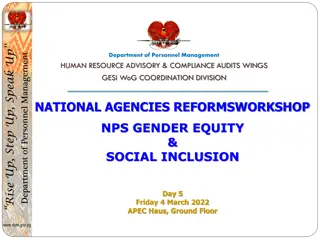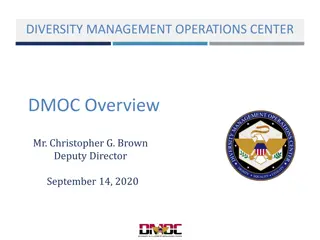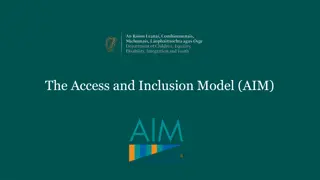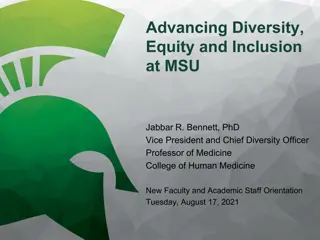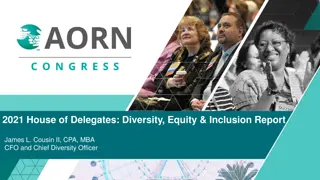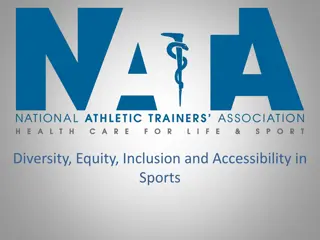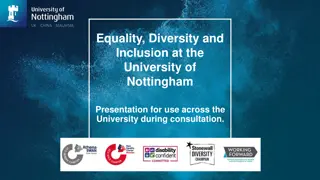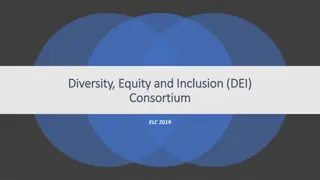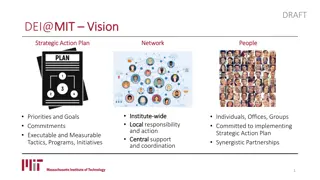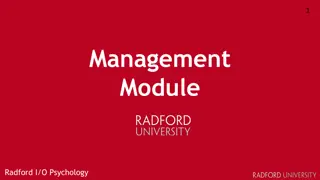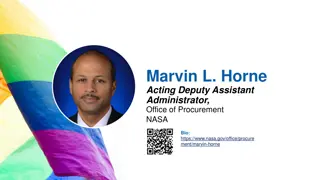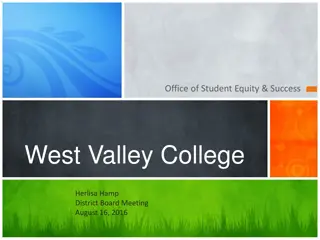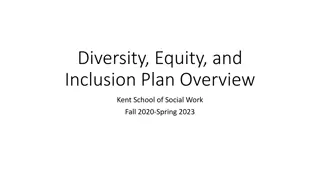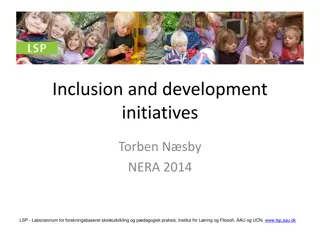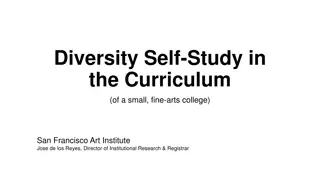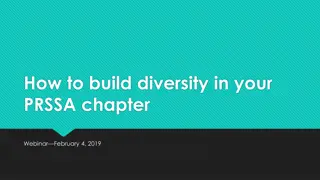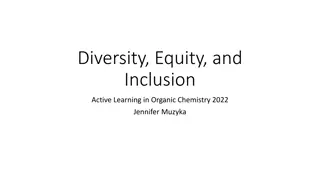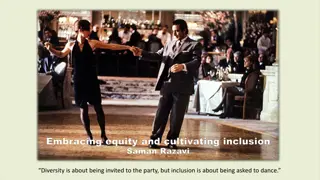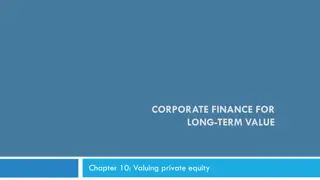Skills for Diversity, Equity, and Inclusion: Lessons and Insights
Evaluation of an NSF-funded workshop on addressing diversity, equity, and inclusion in geoscience facilitation. Qualitative methodology used to gather feedback from facilitator leaders, resulting in key themes and recommendations for improvement.
Uploaded on Mar 09, 2025 | 0 Views
Download Presentation

Please find below an Image/Link to download the presentation.
The content on the website is provided AS IS for your information and personal use only. It may not be sold, licensed, or shared on other websites without obtaining consent from the author.If you encounter any issues during the download, it is possible that the publisher has removed the file from their server.
You are allowed to download the files provided on this website for personal or commercial use, subject to the condition that they are used lawfully. All files are the property of their respective owners.
The content on the website is provided AS IS for your information and personal use only. It may not be sold, licensed, or shared on other websites without obtaining consent from the author.
E N D
Presentation Transcript
IMPROVING SKILLS TO ADDRESS DIVERSITY, EQUITY, AND INCLUSION Lessons from an Evaluation of an NSF funded NAGT Facilitator Workshop B. Flournoy, E. Iverson, and C., Riihimaki Earth Educators/ Rendezvous July 13, 2022 This work was supported by the National Science Foundation through grant #2028640. Any opinions, findings, conclusions or recommendations expressed are those of the authors and do not necessarily reflect the views of the National Science Foundation.
TOWARDA MORE EQUITABLE GEOSCIENCE: A TRAINING WORKSHOPFOR FACILITATORS 2021 Workshop facilitators from the three NAGT workshops: Early Career workshop, Preparing for an Academic Career, and the Traveling Workshop program participated in a workshop focused on three goals: Facilitators will have diversity, equity, and inclusion content knowledge on the personal, programmatic, and institutional scales that are relevant to NAGT workshop participants. Facilitators will practice skills and discuss frameworks that are useful for NAGT workshop facilitation of issues related to diversity, equity, and inclusion. Facilitators will create action plans for how to further diversity, equity, and inclusion content and facilitators' professional development for each workshop type
Methodology A qualitative evaluation using a focus group and interviews to gather feedback from Facilitator Leaders (FL) from Early Career, Career Prep, and Travelling Workshop Programs Objective: To discover FL experiences within their respective roles in the Early Career (EC) Diversity, Equity and Inclusion workshop.; May 2021. The Early Career Facilitator s Workshop Feedback Questionnaire to identify groups perceptions on the strengths, areas of improvement, learnings received for their usage as facilitator leaders The focus group for the Facilitator leaders was a purposive sample of six facilitators. Each interview was conducted between 30 to 45 minutes and focus group an hour. A thematic analysis of coded data
Early Career Facilitator Leaders Focus Group Protocol Early Career Facilitator Leaders Focus Group Protocol
Findings: Analysis Resulted in the Generation of Nine Themes Theme 1 Peer and veteran facilitators network. having facilitators from the different workshops together the way the facilitators model good facilitation and I also really like the interaction with the other facilitators, but I feel like I learn things, it helps me to be a better educator and facilitator Theme 2 Increased time for completion and quicker access to resources. don't have enough time to do what we need to do. Materials on the website for leaders; so much material I can t figure out what to use; we have to clean it up; a lot of time to customize the materials; make the workspace better to more easily facilitate. Theme 3 Engagement and virtual learning I like the idea of being able to bring in a greater diversity of people, and I like the idea that we can do that with the virtual, but I just don't feel like I've gotten good at bringing the participant really into the experience if they are online and we have people in the room. So, the hybrid approach I feel like this could be so amazing, but there are so many problems that I don't think we ve mastered yet.
Findings (continued) Theme 4. Facilitators Current Level of DEI Knowledge and Practice The facilitators in this group are already trying to do those things well and generally I think we do it better. I'm not saying we don't have room to grow, but I think we do it better than many other programs. And so, I felt like I did learn things, but I also think it's worth noting that there already are really substantial knowledge base and efforts in the group as a whole. we're not at a basic training level. We're on a pretty advanced training level, and you don't get that anywhere else, so you actually do get that in these workshops with the group that's assembled, because we're all thinking about this stuff at different levels, and of course we're learning new things, but we're learning it from each other and from other experts who have been practicing this stuff for a long time. Theme 5 Adjusting Your Approach During Facilitation According to Your Audience. But I think I fell into a great, good first few experiences of facilitating where I had.. (excluded names of veteran facilitators) saying, well, I think this could work if we had this group of people, but we have this group of people, so let's try this and let's pivot on this." but did any of the workshops really focus on how to be facilitators? Because I feel like I haven't had that training, but maybe I missed it. I think we fake it well. My wife is a professional facilitator, and she's gone through multiple trainings on things like that, and it's just I know I don't have that level of skill and I don't know if we've ever had that kind of intense training on this is how you facilitate. think we have good instincts on how to do facilitation, but it would be really nice to have a professional facilitator actually train us on, "Here's some ways that you might do things," or, "Here's some pitfalls," or, "Here's some..." I don't know, there's a profession that does it, and we need professionals doing it. you could see in your immediate view, but looking off to the right and swiping a few times over and making sure that I really know who all is in the room and that everyone is really talking or engaging in some way, even if it's just reaction or making polls so that people can engage in that way, diversifying the options for being involved, because not everybody's going to want to turn on their camera, and not everybody's going to want to talk.
Findings (continued) Theme 6 Scale of perspectives addressing equitable Geoscience. Extremely timely; we must understand other peoples culture, not just ethnicity; the facilitator made people aware of the different events in life to make sure we have the optimal zone of transfer to others by having a safe space in order to receive; it allows us to recognize our blind spots and biases. I think some of this is a real issue with our field, and it goes back to the how do we value it? And, again, I think the people that have signed up to do this are leaders and are on board, and there is a real culture issue, some kind of issue, in our field where a huge number of people don't understand the significance of inclusion and diversity and equity. I guess we all know that none of this is appreciated by our peers in our departments. And we do it anyway. I don't even know how this fits in so I'm just going to say it. I think that this effort does a lot for advancing women in geo. Other than my husband and Brandon Jones, I don't think I've seen another, maybe Vernon Morris, yeah, Vernon Morris, I can count basically on one hand the number of active Black male geoscientists of any flavor, any sort of geoscience. And so that's a huge culture beyond geo, but it's a part of the story, so I just had to interject that.
Findings (continued) Theme 7 Learnings from peers, help address hard conversations. I think just incrementally, just at a basic level, the more experience any of us has listening and talking about conversations that can be very difficult, I think that that is a benefit. I think it's all good and that every time we get more experience talking about equity issues, we hopefully get more strategies and also more comfortable with what could be difficult for us or for others. I would say I think these are incredibly hard things to do, and so teaching about them or practicing about them is actually a way to get better at it. getting actual professional facilitator training, because our job is how do we facilitate these discussions when they're difficult, or when we have that area in the room? And I think our instincts are pretty good on how to handle those, but I know there are techniques that professionals can follow on that we don't necessarily have as facilitators of this program. Theme 8 How to effect change in higher education institutions. whether or not this element, the true broadening of participation, broader impacts, diversity, equity, and inclusion, whether they are truly valued by the institution and where is that reflected in tenure and promotion? If it's not an ingrained part of that process, then it's possibly not something that is truly of value for the institution, and that can direct a person who is applying for those positions to be able to see, "Hmm, yeah, this is a place for me," or not. The most pushback I've seen recently has been in comments of people who don't like doing it, the people who don't want to be there don't think it applies to them, don't want to have to deal with it. The pushback is coming in the comments, so more than in the meeting session. And I think most of the early career participants have been quite receptive to learning. So, again, it's a traveling workshop issue more than an early career and probably career prep thing that it's new to them and it's new to many people and they're not as receptive to it. Workshop helped us address those who may be belligerent about equity.
Findings (continued) Theme 9 Perspectives of what s needed as an NAGT Facilitator, when you are not a novice. I feel like the pre-Rendezvous trainings are not geared towards people who have done lots of facilitation. They're really geared towards people who are doing it for first time or doing it for the first time at Rendezvous, or just don't have as much experience through NAGT and that we have a really stellar group of people who have a lot of experience and that maybe we should be thinking about the ways in which we move as a group and can get more. what we need is, we need help reaching the general group, because we're working with career prep, we're working with early career, we're working with the traveling workshop, and we're facilitating meetings to hopefully not just teach them basics, but actually change the culture of the way we do, and that was part of the discussion in the workshop is, how do we facilitate to change that culture? But I think that is where we need more of that training is this is what you talk about. And I think that was what we did in that training for the most part. There was discussion focused on this is how you present it, but maybe not enough. the things that's coming up in my department regularly lately is what do you do about microaggressions? And how do you deal with them, how do you note them? The laws are so that you can't report them, and so it's kind of in this in between land, but it's really important because it really strongly affects students and us. And so more of the training of, as facilitators, how can we help departments come up with strategies to not only get trained about microaggression, but also how do you deal with it when you can't take it up to a higher level of slapping somebody for doing them?
Conclusions and Recommendations from Facilitators Overall the DEI workshop was valuable in presenting foundational DEI practices. Facilitator s gained more knowledge on navigating their audiences and providing DEI strategies from their peers and through the provision of networking and discussion. Facilitators desire more advanced level DEI training, to not only share with their workshop attendees, but how to better negotiate this critical work and find value to their colleagues and institutionalize at their home colleges and universities. Desire a tool to assess the information their audience receives, and how it impacts the work at their respective institutions. (Feedback loop) Facilitators need help reaching the general group, not just teach the basics, but actually change the culture of the way things are done at institutions starting at the department level. Some facilitator s desire more opportunities to do workshops; greater frequency of opportunities for facilitators to facilitate. Desire placement with veteran facilitators, but also to allow the newer ones to have more opportunities and cultivate them to become veteran facilitators.
